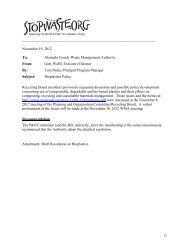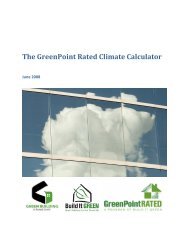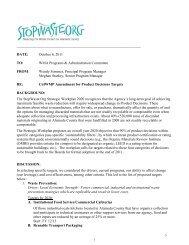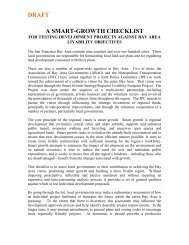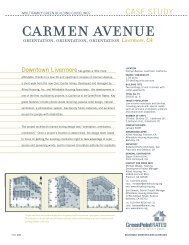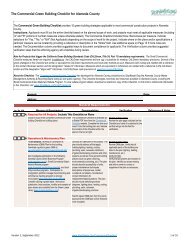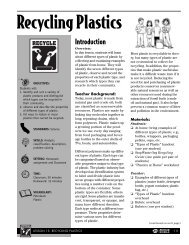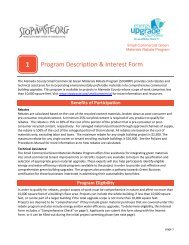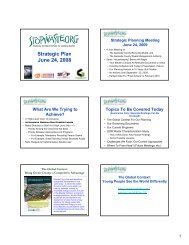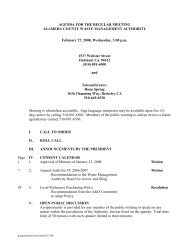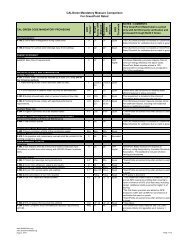Summary of Composting Survey Conducted in ... - StopWaste.org
Summary of Composting Survey Conducted in ... - StopWaste.org
Summary of Composting Survey Conducted in ... - StopWaste.org
You also want an ePaper? Increase the reach of your titles
YUMPU automatically turns print PDFs into web optimized ePapers that Google loves.
How Often / How much Composters CompostListAll respondents identified as composters <strong>in</strong> the survey were asked how much and how <strong>of</strong>ten theycompost both food and yard waste. They compost each type <strong>of</strong> waste at a similar rate - 48% <strong>of</strong>respondents compost 50% or more <strong>of</strong> their food waste while 45% compost 50% or more <strong>of</strong> theiryard waste. Even though there are similar percentages <strong>of</strong> waste composted, food waste iscomposted more <strong>of</strong>ten (21% food waste every day) than yard waste (3% yard waste every day).These responses seem to follow common disposal needs, as food waste is usually dealt withdaily, while yard waste is disposed less <strong>of</strong>ten <strong>in</strong> most households.A segmentation was created to exam<strong>in</strong>e food and yard waste disposal, by comb<strong>in</strong><strong>in</strong>g responsesabout what percentage <strong>of</strong> waste is composted and how <strong>of</strong>ten compost<strong>in</strong>g occurs, <strong>in</strong> order tounderstand who composts more or less.In exam<strong>in</strong><strong>in</strong>g the frequency and volume <strong>of</strong> food waste disposal to the compost it is found that37% <strong>of</strong> the overall tend to compost more food waste, more frequently, while 38% compost lessfood waste, less frequently. The rema<strong>in</strong>der <strong>of</strong> the population either don’t know, respond thatthey never add food or add no food, or answered someth<strong>in</strong>g else (9%). The rema<strong>in</strong>der are notcomposters (17%).Exam<strong>in</strong><strong>in</strong>g the frequency and volume <strong>of</strong> yard waste shows that 43% <strong>of</strong> the overall populationcompost more yard waste, more <strong>of</strong>ten while 23% compost less yard waste, less <strong>of</strong>ten. Thepercentage <strong>of</strong> non-composters <strong>of</strong> yard waste <strong>in</strong>creases to 26%, which reflects the fact that wormb<strong>in</strong> users were asked about food waste compost<strong>in</strong>g, but not about yard waste compost<strong>in</strong>g, andtherefore worm b<strong>in</strong> owners appear as “non-composters” when it comes to yard waste. Thosewho responded someth<strong>in</strong>g else <strong>in</strong> reference to compost<strong>in</strong>g their yard waste come <strong>in</strong> at 9%.The respondents who compost less food waste tend to be males (52%) when compared to theoverall List male population <strong>of</strong> 44%. Those who compost less food waste also tend to be lesseducated when compared to the overall, with 34% <strong>of</strong> the ‘compost less’ category hav<strong>in</strong>g no/somecollege and only 24% <strong>of</strong> the overall hav<strong>in</strong>g no/some college.A def<strong>in</strong><strong>in</strong>g feature <strong>of</strong> those who compost more food waste is that a plurality tend to have a mix<strong>of</strong> types <strong>of</strong> b<strong>in</strong>s/piles/worm b<strong>in</strong>s (46%). Those who compost more food waste also tend to havestarted compost<strong>in</strong>g before the implementation <strong>of</strong> the Food Scrap Recycl<strong>in</strong>g Program (81%).Respondents tend to compost more food waste if they were already compost<strong>in</strong>g when theybought their current b<strong>in</strong> (66%). More frequent/higher volume food composters also stronglydisagree with the statement “<strong>Compost<strong>in</strong>g</strong> is not necessary because we already recycle enough” ata rate <strong>of</strong> 89%.The yard waste compost<strong>in</strong>g frequency shows that those who compost more yard waste tend to bebetween the ages <strong>of</strong> 35-39 (24%). They also tend to have a mix <strong>of</strong> types <strong>of</strong> compostb<strong>in</strong>s/piles/worm b<strong>in</strong>s (43%).Page 17ACWMAEMC 05-3307<strong>Compost<strong>in</strong>g</strong> <strong>Survey</strong> <strong>Summary</strong> (Draft)




